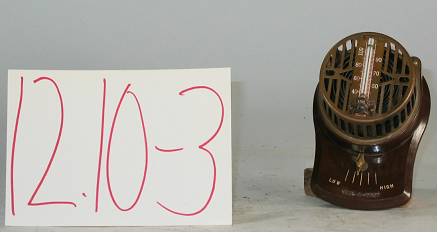Pressure Atomizing Oil Burner Equipment and Systems – Room Temperature Thermostats
An eye appealing, early automatic room temperature control device, using a helical by-metal spring temperature sensor, with mercury bulb, line voltage switching. Temperature control devices of this genre, would introduce automation into the Canadian household, set new standards of winter comfort and convenience for Canadians, and in so doing become markers of a new technology-based consumerism and thus of profound, Canadian, social and cultural change; Cat. No 135, Time-O-Stat, Circa 1928. [See also ID# 218]
Technical Significance:
* The competing thermostat technologies of the day were helical bimetal spring, shown here, and hydraulic bellows designs, [See ID 214].
* Much smaller and more finely sculptured than its competitors [Penn and Mercoid] the Time-O-Stat would have greater eye appeal and potential sales appeal, as a result.
* Actuated by a hefty, eight turn, 3/8″, 1 13/16″ OD, helical bimetal, this control can be expected perform only modestly well. With substantial inertia, and with out heat anticipation features of future generations of such devices, the home owner will experience significant over and under run and slow system response. The good news is that, with a 2 degree operating differential, it will provide comfort home conditions unparalleled for its times.
* In an astonishingly simple configuration, a 3/8″ dia. x 1 3/4-mercury bulb is attached to the floating, rear centre point of the bimetal, to which a delicately shaped brass adjustment lever is also attached. This allowing the householder to set the desired home temperature by tipping the switch bulb manually to the desired temperature.
Industrial Significance:
* An elegant room thermostat that would be seen on the walls of the drawing rooms of the Canadian well-to-do in the 1920’s.
* Tastefully and delicately proportioned, in a modest, brown, molded Bakelite case, it was a masterpiece of industrial design, instantly attracting homeowners of the period to a new, modern lifestyle of comfort and convenience.
* With patent numbers shown in the manufacturers catalogue from 1918 to 1928, Time-O-Stat must surely be accorded the position of HVACR market leader in the development of electric, room thermostatic controls for automatic, oil-fired heating systems found in Canadian homes.
* Time-O-Stat would quickly become the market leader in the new Canadian consumer culture of the 20th century, where the company would find that appearance was everything.
* Time-O-Stat products would soon appear in the catalogues of a new industry leader, Minneapolis Regulator Co. under that company’s name.
* The competing thermostat designs of the 1920’s and early 30’s [See ID #213, 214, 215] amply demonstrate the immense inventiveness of the period in which a range of technologies were being experimented with for automating home heating systems.
* Simple devices, by 21st century standards, they were non-the-less products of great engineering ingenuity for their times. They required materials and manufacturing techniques and expertise, which challenged the best engineering minds of the day.
* The attention given by Time-O-Stat to the market place and to the consumer’s appetite for the new, novel, attractive and prestigious was seen in their portable “Thermoswitch”. It was configured in the form of a minature, classic mantel clock of the period. It was inteded to stand out in the living rooms of the well-to-do, as a conversation piece and object of desire [See cat F.277-15.429, Page 12]
* Time-O-Stat’s pension for innovation was also marked a nigh-time clock operated temperature set back control, likely the first of its kind [See cat F.277-15.429, Page 11], and an early forerunner of the classic Minneapolis Honeywell Chronotherm [See ID # 216.
* Time-O-Stat would be unique in its times, bringing to the market a systems approach, providing a comprehensive, integrated set of controls for residential and commercial heating applications. “Lockswitch” safety combustion control engineering by Time-O-Stat would be the standard of the industry throughout the 1920’s and early 30’s [ See series 12.8 artifacts]


